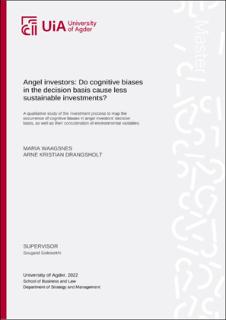| dc.description.abstract | Angel investors are an essential part of a startup’s financing cycle, contributing venture capital and experience in a phase characterized by a high risk of failure. As they invest with private funds and ultimately make an independent decision to invest, we consider how rational their decision basis is by testing for cognitive biases. There is increasing pressure on investors to make sustainable investments, but numerous different guidelines make it challenging to determine their strategies. We have examined angel investors’ assessment of environmental variables and their experience with sustainable investment strategies. The research aims to answer the problem statement; Do cognitive biases in angel investors’ decision basis cause less sustainable investments?
The study is based on a qualitative research method. After selecting a sample size based on non-probability selection, we conducted semi-structured interviews with ten angel investors for qualitative depth. A content analysis was performed to map patterns in the data material and then presented findings that answered our research questions. We found that angel investors’ decision basis is not fully rational, as various cognitive biases occur during the assessment of an investment case. Findings indicate an evident occurrence of the three cognitive biases herd mentality, confirmation bias, and framing cognitive bias. Furthermore, we found that most angel investors did not emphasize environmental variables in their decision basis. They had limited knowledge of ESG investing, but their investment process had similarities to different ESG strategies. This suggested that they did not have a conscious relationship with their own sustainability strategy. Angel investors expressed challenges in implementing sustainable investment strategies, which indicate that they largely assess based on their own perception of sustainability. Lack of sustainability expertise proves to be a fundamental problem for why angel investors do not consider environmental variables. The research findings indicate that the angel investors’ decision basis is a complex area that requires further research, particularly on additional cognitive biases and other psychological factors. Our research can help to increase angel investors’ awareness of their own assessment process and provide an incentive to raise sustainability competence in the ecosystem. | |
